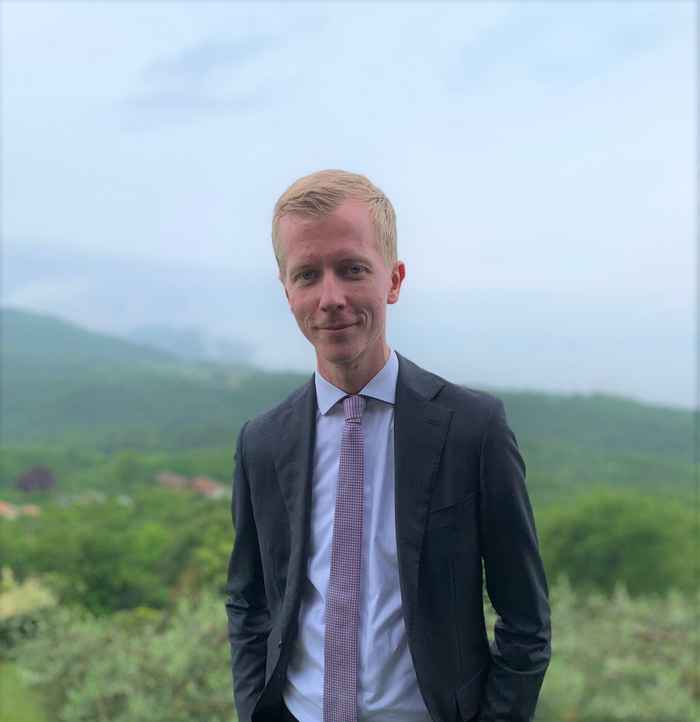'Competition law has always fascinated me'
Interview with law alumnus Bob Bulthuis
11 December 2023

Alumnus Bob Bulthuis is case handler officer at the European Commission's Directorate-General (DG) Competition. The international working environment really appeals to him. Colleagues come from all over the European Union. 'Every country has its own working methods. That makes working in Brussels very interesting, but sometimes also very complicated. You learn a lot from it.' Bulthuis has a background in competition law. In 2016, he is following the Master's track European Competition Law and Regulation at the UvA. 'Competition law has always fascinated me. In Brussels, this is pre-eminently the part where the European Commission has a lot of influence and can decide a lot itself, independently of the member states.'
From the very beginning of his studies, Bulthuis is interested in the European Union. He starts with the Bachelor's degree in European studies. During the European law course, he was introduced to competition law. 'That is where the seed was planted,' says Bulthuis. He then found the Master's track in which he can focus specifically on competition law. After his studies, he became an intern at the European Commission. 'I stuck with the European Commission after my internship.'
What does DG Competition do?
'In short, there are 3 pillars,' Bulthuis explains. 'The first pillar, Antitrust and cartels, concerns companies that would collude on prices or abuse their dominant position in the market. This is both prohibited and contrary to European competition rules. The second pillar deals with mergers. If mergers between companies exceed a certain threshold, they must be authorised by the European Commission. Such a threshold could be, for example, the global turnover of the merging companies.'
Bulthuis himself works in the third pillar: state aid. 'That is also banned in principle. European member states cannot just subsidise companies or institutions. That is subject to rules to prevent unfair competition.' Until about a year ago, he worked in a department dealing with state aid in sectors such as postal delivery and healthcare. Now, his focus is not on a specific sector, but rather on a particular way of providing state aid: through taxation. Bulthuis explains that state aid is not always direct subsidies to companies, but can also consist of tax breaks. 'The European Commission has investigated a few large multinationals, such as Apple and Fiat, and there are ongoing investigations into Nike and IKEA, for example.' Ultimately, the courts and the Court of Justice in Luxembourg decide whether they agree with the decision the Commission has taken. 'In the case of the multinationals, the Commission has ordered the member states concerned to recover the tax that has not been paid. But in the case of Fiat, the Court of Justice just cancelled the Commission's decision.'
How do you get onto tax breaks?
'It is a substantiated suspicion. There have been many investigative journalists looking at corporate tax structures in recent years. Think of the Panama Papers and the LuxLeaks, for instance. We can see if there is an issue that would warrant investigation by the European Commission. On a smaller scale, we also see national media catching something. Furthermore, something may come to us through complaints, often from competitors of companies suspected of having received such an advantage. Another way things come to us is that member states themselves come to us before giving tax breaks or direct subsidies. They ask whether their plan is in line with state aid rules.'
‘Don't be too modest’
Students aspiring to a position at the European Commission, Bulthuis advises, should do internships. The EC offers so-called Blue Book internships, but the European Parliament and the Council also have their own internship programmes. When it comes to competition law, there is a lot to be found in Brussels, as most law firms dealing with it are in the Belgian capital. 'If competition law is something that interests students, DG Competition is definitely the place to be.' Bulthuis stresses that there is a lot of competition. 'Interested people come from all over the European Union. That is why it is important that your language skills are up to scratch. Make sure you have knowledge of at least a third language in addition to English and Dutch. Also do activities outside your studies, preferably relevant in terms of content. And do not be too modest. Dutch students are often more reserved in mentioning activities or language skills than others.'
Lastly, Bulthuis also recommends looking at the Dutch Permanent Representation in Brussels and the Ministry of Foreign Affairs. They offer support to people interested in a job with the European Union. 'I personally benefited a lot from that, because I ended up getting a permanent job here.'